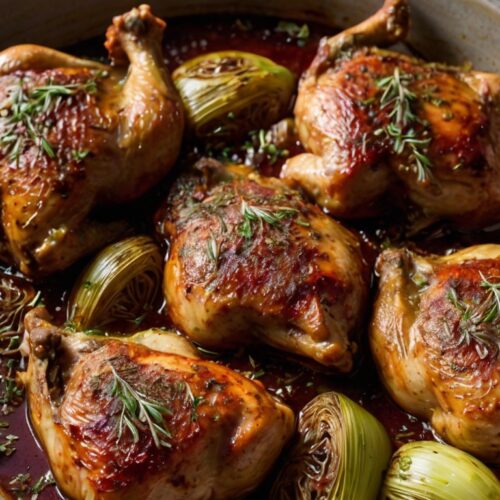Step back in time and experience the flavors of ancient Rome with Parthian Chicken, or Pullum Particum, a dish that reflects Rome’s fascination with exotic tastes and the cultural influences they encountered during their empire’s expansion.
This Roman chicken recipe, featured in the famous cookbook De Re Coquinaria by Apicius, is an enticing blend of tender chicken thighs, aromatic leeks, red wine, and a medley of spices that transports us to the opulent feasts of Roman society.
Today, we explore not only the dish but the fascinating history that links it to one of Rome’s most formidable rivals, the Parthian Empire.
De Re Coquinaria by Apicius
Pullum Particum is a recipe recorded in the ancient Roman culinary collection known as De Re Coquinaria, attributed to Apicius, a famed Roman gourmand. The cookbook, compiled around the 4th or 5th century AD, contains hundreds of recipes that provide a glimpse into the sophisticated culinary practices of the Roman elite.
Parthian Chicken gets its name from the Parthian Empire, a reference to the foreign, exotic spices used in the dish, evoking the flavors of the distant East.
Roman cuisine often borrowed from the cultures it encountered, incorporating spices and techniques that represented the wealth and reach of the empire.
Who Were the Parthians?
The Parthian Empire (247 BC – 224 AD) was a major power in ancient Persia, located in what is today Iran. The Parthians were known for their skilled horsemen and archers, as well as their extensive trade networks that connected the East and the West along the Silk Road.
They were formidable rivals of Rome, and their culture was seen as exotic and mysterious by the Romans, who both admired and feared their power.
The name “Parthian” in Pullum Particum is likely a nod to the spices and flavors associated with this distant land, which would have been seen as luxurious and adventurous for Roman diners.
Parthia’s Relationship with Rome
The relationship between Rome and Parthia was complex, marked by rivalry, diplomacy, and cultural exchange. The two empires were often at odds over control of territories in the Near East, particularly Armenia and Mesopotamia.
Despite their rivalry, there was a significant amount of trade between Rome and Parthia, with goods such as spices, silk, and precious metals flowing between the two empires.
These exchanges influenced Roman cuisine, and dishes like Parthian Chicken reflect the incorporation of exotic ingredients that came from or through Parthian lands.
The Battle of Carrhae
One of the most significant events in the history of Roman-Parthian relations was the Battle of Carrhae in 53 BC, where the Parthians dealt a crushing defeat to the Roman general Crassus.
This battle was one of the worst defeats Rome ever suffered and showcased the superior tactics and cavalry of the Parthian forces. The Parthians’ effective use of mounted archers and their famous “Parthian shot” — firing arrows while retreating — humiliated the Roman legions.
Despite the military conflicts, the cultural influence of Parthia persisted, especially in Roman cuisine, where dishes like Pullum Particum emerged as a culinary tribute to the flavors of their powerful eastern rivals.
Parthian Chicken Recipe:
Now that we’ve explored the rich history behind Parthian Chicken, let’s recreate this ancient dish in your own kitchen.
If you’re enjoying my content consider buying me a coffee 🙂

Parthian Chicken (Pullum Particum)
Ingredients
- 6 chicken thighs
- 1 large leek finely chopped
- 1 cup red wine
- 1 tablespoon ground arugula
- 1 teaspoon cumin seeds
- 1 teaspoon dried celery leaves
- 1 teaspoon black pepper
- Olive oil for cooking
Date Paste:
- 1 cup pitted dates
- 1/4 cup warm water
Instructions
- Prepare the Chicken: Preheat your oven to 350°F (175°C). In a large oven-safe skillet, heat a few tablespoons of olive oil over medium heat. Add the chicken thighs and cook until they are browned on both sides, about 6-8 minutes per side. Remove the chicken and set aside.
- Cook the Leek: In the same skillet, add the chopped leek and sauté until it becomes soft and fragrant, about 5 minutes. Add a bit more olive oil if needed.
- Add the Wine and Spices: Pour in the red wine and bring it to a gentle simmer. Add the ground arugula, cumin seeds, dried celery leaves, and black pepper. Stir well to combine.
- Bake the Chicken: Return the browned chicken thighs to the skillet, ensuring they are coated in the wine and spice mixture. Transfer the skillet to the preheated oven and bake for about 25-30 minutes, or until the chicken is fully cooked and tender.
- Serve: Once the chicken is cooked through and the sauce has thickened slightly, serve the Parthian Chicken hot. This dish pairs well with crusty bread or a side of roasted vegetables, perfect for soaking up the flavorful sauce.
Date Paste:
- Soak the Dates: Place the pitted dates in a bowl and cover them with the warm water. Let them soak for about 10 minutes to soften.
- Blend: Transfer the soaked dates and any remaining water to a blender or food processor or mortar and pestle. Blend until smooth, adding a bit more water if needed to reach a spreadable consistency.
- Serve: Serve the date paste alongside the Parthian Chicken as a sweet accompaniment. It pairs beautifully with the spices in the dish and adds a delightful contrast to the savory flavors.
Video
Notes
- Control the Spice Level: Adjust the amount of black pepper to suit your taste. Ancient Roman recipes often used pepper liberally, but you can reduce it if you prefer a milder flavor.
- Use an Oven-Safe Skillet: For convenience, make sure your skillet is oven-safe so you can easily transition from stovetop to oven without transferring the chicken to a different dish.
- Date Paste Sweetness: If you prefer a sweeter date paste, add a teaspoon of honey while blending for extra richness and depth of flavor.